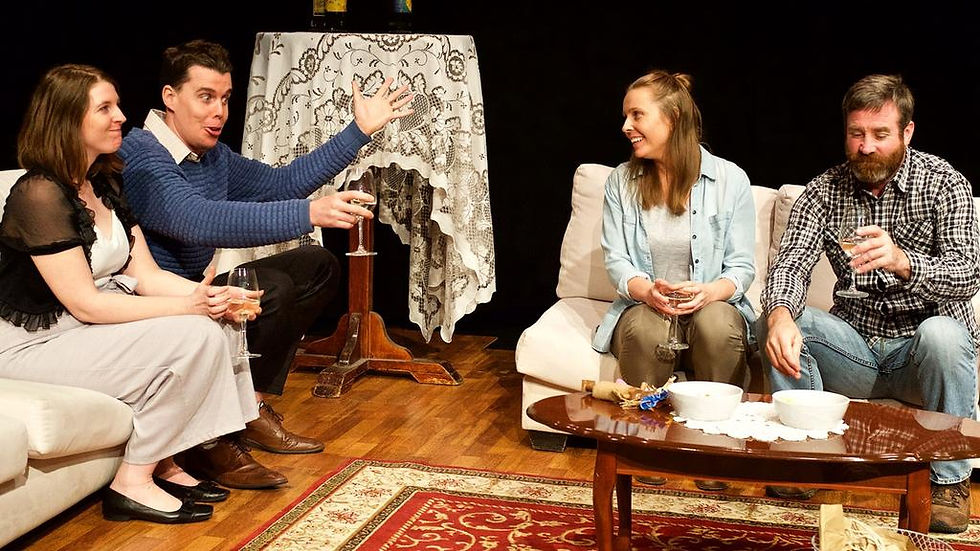Review: Peggy Pickit Sees the Face of GOD at the Bakehouse Theatre
- Theatre Travels

- Jun 13, 2019
- 3 min read
By Jennkh
The song ‘What a piece of work is man’ from the musical Hair closes Joh Hartog’s production of ‘Peggy Pickit sees the face of God’ and strikes a reflective chord with the audience. This is not to the detriment of the closing moments of the play but heightens the journey we have been taken on. Some of us also recognise the quote from Shakespeare’s Hamlet as he reflects on the uniqueness of the human species, and the irony of how terrible a person can be.
We are led to our own reflection of this dichotomy in human nature through the relationship of two couples who have known each other for years, taken divergent work/life paths and reunited after 6 years absence. Liz and Frank have followed the typical trajectory of house, car in the garage, child – safe western lives. Carol and Martin, both doctors, have spent the intervening six years in an unnamed African country, working in a medical facility until they are forced to return home due to the (unexplained) deteriorating situation in said country.
The play opens with Carol and Martin arriving for dinner and the slightly awkward and over-reactive greetings and chit-chat, the not-quite-sure-where-to-sit, and quick offers of drinks gives a sense of the two very different places these friends have been and maybe they have grown too far apart?
The style of playwright Roland Schimmelpfennig’s play allows the actors to step out of character and address the audience directly – a Brechtian type of delivery. These asides are bookended by repetition of the two or three lines delivered before the break in the action. I found this curious in the sense of wondering what was important in seemingly innocuous text that it warranted repetition. As the play progresses so do the subtle shifts in delivery of that repetition and the nuances added in emotional sub-text. I also appreciated the attention to physical detail as the other characters remained still and/or returned to previous physical places.
And through this device we discover very early on that Martin, (played by Brendan Cooney) really loathes dinner parties and his way of dealing with it is to drink a lot. As he proceeds to do, becoming more morose and introverted as the evening wears on. But he also faces the marital dilemma of honesty and betrayal and attendant reason for childlessness. (I won’t spoil the denouement.)
Krystal Brock plays Carol, the ‘bleeding heart’ of the four. All her emotions are close to the surface – her desire for the world to be a better place, to do her bit, and trying to reconcile the perceived betrayal within her marriage. Liz (Lucy Markiewicz) on the other hand seems to be facing the realisation that her life, apart from her daughter, is a tedious round of domesticity. Is there a hint of professional jealousy – appeasement of conscience of social injustices through donations to an underprivileged child?
Frank seems to vacillate between trying to keep everyone happy, not having his comfortable life upset and enjoying the rise in tension and acerbity as the dinner progresses. Played with verve by David Hirst he provides a levity not felt or sometimes appreciated by the other characters as he tops up everyone’s drinks throughout.
The scene of the (real) dinner, actually eaten by the actors, is the most naturalistic and free. How much was scripted and how much was improvised as they worked their way through pasta and bread and accidental spills flowed around a story Martin tells which ends nowhere but has taken us into a new phase of uncovering the simmering sub-text.
All of this finally explodes as each one is pushed to verbalising what has been lying underneath and we are left with the song ‘what a piece of work is man’ and I find myself nodding in recognition of Hamlet’s exposition that although humans may appear to think and act "nobly" they are essentially "dust". Interestingly Hamlet is expressing his melancholy to his old friends over the difference between the best that people aspire to be, and how they actually behave. The analogy between that and these friends is an intelligent finale.
The four actor’s play their parts with commitment to Joh’s direction – Lucy Markiewicz finding subversive comedic delivery and timing, Krystal Brock with underlying betrayal of innocence, David Hirst with loping mobility. Brendan Cooney describes acting as ‘a hobby that sometimes pays’ in the programme notes and to my mind his portrayal of Martin is the standout.
If you like theatre that gently persuades you to think about big issues without being didactic, then go! At just over an hour it’s humourous, engaging and challenging. It’s on at the Bakehouse, a lovely warm, hospitable venue until 15th June.
As for Peggy Pickit? I won’t spoil that for you either…go!

All opinions and thoughts expressed within reviews on Theatre Travels are those of the writer and not of the company at large.




